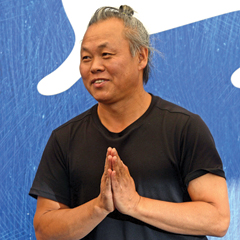 Director Kim Ki-duk
Director Kim Ki-dukA Kim Ki-duk film playing in Venice is hardly an unprecedented event, but by now one question is prompted by the appearance of any new title from the famously prolific and divisive director: which Kim Ki-duk will show up this time? Will it be the melancholic, pictorialist humanist of 2003's "Spring, Summer, Fall, Winter... and Spring"? The blackly comic, mischief-making mutilator of 2013's "Moebius"? The taciturn, ambiguous symbolist of 2005's "The Bow"? The PETA-unfriendly purveyor of 2000's notorious "The Isle" with its live frog-skinning? Or, given that his greatest Venice success to date (the Golden Lion, the festival's highest honor) came with 2012's controversial endurance test "Pieta," will that be the filmmaker who returns: the abrasive, confrontational chronicler of violence, cruelty, revenge, and redemption amid deeply perverse familial relationships?
The answer, you may not be surprised to learn, is none of the above. The Kim Ki-duk of "The Net" gives us an indifferently crafted, surprisingly talky spy thriller that earns considerable interest from the specificity of its setting, but gradually squanders it over a too-long runtime in which the same quandaries are mined so thoroughly that it eventually numbs you to their human cost. Initially, however, there is the setup of the film's instantly compelling premise. Nam (Ryoo Seung-bum) is a North Korean fisherman, who lives in squalor but apparent contentment in a shack by the water right at his famously repressive nation's famously contentious border with South Korea.
Geopolitical lines
One morning he goes out, in the tiny boat that represents his whole fortune (as he tells the border guard on duty), to pull the net in. But it gets caught up in the boat's engine, and the day's strong tide, which respects no imaginary geopolitical lines, pulls him inexorably into South Korean waters. Seeing him stray off course, the guards are immediately suspicious that he might be defecting, but are too far away to be sure that it's not the accident it appears to be, and refrain at the last moment from shooting him. Nam drifts onward into a bank of rushes where he's picked up by South Korean border guards, who immediately suspect him of being a spy.
He is taken to Seoul for questioning-a journey through which he insists on keeping his eyes closed, so he will have nothing to report to his own authorities when he gets back and faces their questions. His predicament is clear, but it is considerably worsened by the interrogator assigned to him (Kim Young-min) being a paranoid bully with an historical hatred of North Koreans that is more personal than ideological, and an uncanny knack for seeing spies where there are none, or indeed creating them out of previously innocent men. In contrast, Nam is also assigned a much kinder, younger agent, Oh Jin-woo (Lee Wong-gun), as a guard.
Fairly convinced
Oh and Nam bond, with the younger man believing in Nam's innocence and coming into conflict with his superiors for concluding that he should be sent back home to his wife and daughter rather than forced to defect. His bosses, even though they seem fairly convinced that Nam is no spy, believe it's their moral duty to "liberate" as many people from "the dictatorship" as possible, whether those people wish to be so liberated or not. It's an interesting political point that Kim is making: dogmatic belief, even in democracy and the freedom represented by capitalism, is as much a form of brainwashing as subservience to an all-powerful, despotic Leader. The problem is, it's the same point he keeps on making, and in a flat, not particularly inspired visual style to boot (Kim acts as his own cinematographer here, too). And so the film never truly capitalizes on the idea that each side in this ongoing and intractable conflict is as bad as the other, and the representatives of each are as corrupt and cruel as their counterparts across the border. And at the center of it all, despite some strong, charismatic work from Ryoo, Nam remains a frustratingly thin personality. Essentially the personification of the wronged, simple man longing for his family but trapped, as he says, like a fish in a net, Nam becomes a Job-like figure defined more by his travails and afflictions than by any real sense of an interior life.
Desire for balance
Even when the film takes an unexpected turn when Nam encounters a fellow North Korean who actually is a spy, Nam's innocence, to the point of credulity-defying naivete, is maintained. And this is all before he finally does fall back into the hands of the North Korean authorities, which you know has to happen so that Kim can prove the ambivalence of his equivocal thesis. This straight-down-the-line trajectory, this deterministic desire for balance, is sincerely meant, but it's also mystifyingly undynamic, especially for a filmmaker so well-versed in the fine art of provocation. For a time, in fact, those versed in the twistiness and twistedness of Korean genre cinema in general, and Kim's splashy, diverse oeuvre in particular, might suspect a very complex double-bluff in which Nam's innocence is being so clearly signposted just to throw us off the scent of a major gotcha down the line.
But the film's largely unkinked storyline yields no such surprises, favoring instead a simplistic read on a complex situation that ultimately does little more than restate the problem to the point of white noise. And that then makes "The Net's" late-breaking bid for tragic irony feel even more unearned: the only irony here is that Kim Ki-duk seems so doggedly insistent on creating political parallels and sharing ideological blame equally that, like the regimes he critiques, he loses any sense of the human beings caught in the crossfire.-Reuter










